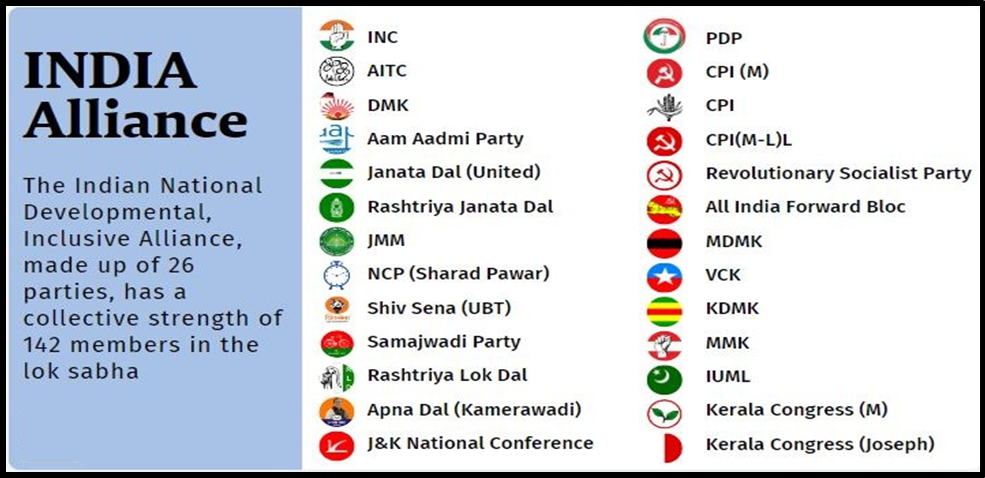ELECTING AN OPPOSITION WITH GREATER NUMBERS IN PARLIAMENT, IT CAN BE A STRONG DEFENDER OF RIGHTS
Syllabus:
GS-2:
Constitutional Bodies, Transparency and accountability, Representation of people Act.
Focus:
The recent Indian elections saw the National Democratic Alliance (NDA) secure a third term in office, while the Indian National Developmental Inclusive Alliance (INDIA) made significant gains despite challenging pre-election conditions. This election underscores the evolving political landscape and the crucial role of a robust Opposition in defending democratic rights.
source:eduprep
Understanding the Election Outcome:
- NDA’s Third Term: The National Democratic Alliance (NDA) secured a third term in office after a highly competitive election.
- INDIA’s Synergy: The Indian National Developmental Inclusive Alliance (INDIA) overcame initial discord to achieve significant synergy leading up to the election.
- Challenges Faced: The election was marked by actions against the Opposition, such as arrests and freezing of bank accounts, yet INDIA managed to win 234 seats.
- Biases in the Process: Pre-election biases and targeted actions against Opposition parties highlighted the challenging electoral environment.
- Credit to INDIA: Despite these hurdles, the INDIA bloc’s performance is commendable and noteworthy.
Understanding Parliamentary Opposition in India:
Constitutional Position of Opposition Party:
Key Constitutional Provisions Related to Parliamentary Opposition in India:
What is the INDIA Coalition?
|
Implications for NDA Allies:
- Historic Opportunity: For NDA allies, especially the Telugu Desam Party (TDP) and Janata Dal-United (JD-U), this election presents a historic chance to advocate for the rule of law.
- Lok Sabha Speaker’s Post: The potential appointment of TDP and JD-U members as Lok Sabha Speaker would benefit parliamentary deliberation, which was restricted in the past five years.
- Home Minister’s Role: A crucial objective for the NDA should be to ensure the Home Ministry adheres to a rule-of-law approach, especially given past attacks on civil society.
- Supporting Reforms: INDIA should back these demands to strengthen democratic processes in Parliament.
- Rule of Law Focus: Emphasizing constitutional governance and civil rights is vital for the NDA allies to distinguish themselves positively.
INDIA’s Role as a Strong Opposition:
- Effective Opposition: INDIA’s role as a formidable Opposition is more beneficial than attempting to unseat the NDA or form an administration.
- Learning from History: The BJP’s destructive role with 167 seats in the 15th Lok Sabha serves as a cautionary tale of how a strong opposition can hinder governance.
- Preventing Dysfunction: With 240 seats, BJP might block any Opposition administration’s functioning, potentially leading to midterm elections favoring NDA.
- Defender of Rights: A powerful Opposition can defend democratic rights in Parliament and anchor itself in the public consciousness.
- Historic Opportunity: Opposition parties have a unique chance to advocate for democracy and civil rights, building on the relative success of localized campaigns.
Mobilizing Civil Society:
- Civil Society Support: Human rights, anti-corruption, and transparency groups, along with farmers, students, and professionals, have backed Opposition campaigns, reminiscent of past democratic movements.
- Fourth Wave of Democracy: The country may be approaching a fourth wave of democratic renewal, similar to movements in 1977, 1989, and 2004.
- State-driven Change: Historically, democratic renewal has often started in states; current movements show states’ pivotal roles in pushing back against central encroachments.
- Friction with Central Authority: The central administration’s appropriation of power, reduced tax revenue shares for states, and misuse of the governor’s office have fueled state-level resistance.
- Regional Party Dynamics: The capture or fragmentation of regional parties has been crucial in states like Maharashtra and Tamil Nadu, influencing election outcomes significantly.
Future Directions and Recommendations/Way Forward:
- State Rights Defense: Defending state rights will be crucial in upcoming elections and during the fresh delimitation of constituencies in 2026.
- Residual Taxation Powers: Revisiting the 1971 Rajamannar Committee’s recommendation for states to have residual taxation powers can strengthen state autonomy.
- Electing Governors: Amending the process to elect governors by state legislatures could prevent misuse by the Union administration.
- Addressing Delimitation Concerns: Population-based representation can disadvantage more developed states; exploring alternative models, like the U.S. Senate’s equal representation, could be beneficial.
- Federal Democratic Culture: Encouraging states to implement transparency, employment, and inclusion programs can anchor a federal democratic culture, leading by example on civil rights and economic initiatives.
Conclusion:
India’s recent election outcomes highlight the significant role of both the ruling alliance and the Opposition. The NDA allies, particularly TDP and JD-U, have a historic opportunity to reinforce constitutional governance, while the INDIA bloc can effectively defend democratic rights and influence public discourse. Mobilizing civil society and focusing on state rights will be crucial as India navigates its fourth wave of democratic renewal. By addressing these challenges and recommendations, both sides can contribute to a stronger, more vibrant democracy.
Source:The Indian Express
Mains Practice Question:
Discuss the implications of the recent Indian elections on the functioning of Parliament and the role of the Opposition in defending democratic rights. How can the Opposition effectively contribute to reinforcing constitutional governance and addressing civil society concerns?




